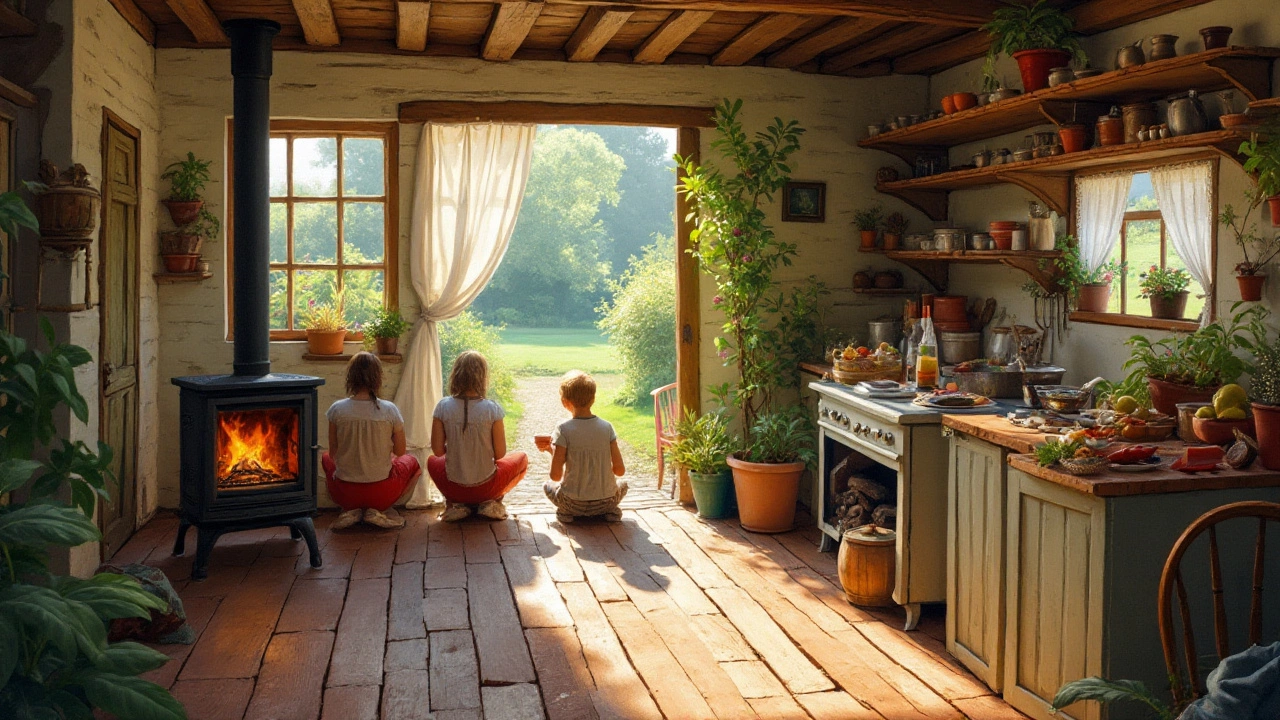Embarking on a journey can be much more than just a change of scenery; it can be a taste of freedom and authenticity. Self-catered residences, often dubbed as self-catering cottages, enable travelers to indulge in a home-away-from-home experience. These accommodations offer a unique blend of comfort and independence, welcoming those who are looking for more than the conventional hotel stay.
- What Defines a Self-Catered Residence?
- Why Choose Self-Catering Over Traditional Accommodations
- Essential Amenities in Self-Catered Residences
- Interesting Facts About Self-Catering Options
- Tips for Selecting the Best Self-Catered Accommodation
What Defines a Self-Catered Residence?
In the realm of travel accommodation, the term self-catered residences might arouse curiosity among those accustomed to the structured offerings of traditional hotels. At its core, a self-catered residence is a lodging establishment designed to provide guests with the essentials to manage their living and dining needs independently. Unlike conventional accommodations where meal times and housekeeping are dictated by staff availability, here, freedom reigns supreme. These residences typically feature kitchens equipped with functional appliances such as stoves, refrigerators, and microwaves, allowing culinary enthusiasts the delight of preparing home-cooked meals while away from home.
The concept of self-catering goes far beyond just cooking. It’s about granting travelers the autonomy to curate every facet of their stay. Consider a picturesque cottage nestled in the heart of the countryside or a charming city apartment offering exquisite views. Each of these self-catered residences is tied together by a singular ideology: control and independence. Guests have the liberty to schedule their days at will, free from the confines of hotel timelines. This type of lodging often includes additional amenities such as living spaces, laundry facilities, and sometimes even outdoor spaces like gardens or patios. These offerings elevate the experience from mere accommodation to an immersive living environment.
Historically, self-catering options gained prominence as travelers began seeking more personalized experiences. The dimensions and styles of these residences know no bounds, ranging from quaint one-bedroom cottages to expansive villas capable of housing entire families. With this versatility comes the opportunity to cater to a myriad of preferences and needs. The shift towards such autonomous arrangements is fueled by a desire not just for privacy, but for an authentic lifestyle experience. It's not uncommon for travelers who choose self-catering to also explore local markets, relishing the chance to sample regional flavors and bring them to their kitchens.
One might ask, what truly makes self-catering appealing in the face of such logistic demands? An advantage of self-catering cottages lies in their cost-effectiveness. While hotels tally up bills with service charges and dining expenses, a self-catered residence lets travelers manage their budgets with autonomy. They can choose to dine out or savor a homemade feast; every choice is theirs to command.
"Travel is enhanced when the journey is at one's own speed and leisure," remarks Elizabeth Smith, a renowned travel consultant, emphasizing the growing allure of these flexible accommodations.An additional factor is the potential for a longer stay. Without the predictable overheads of traditional lodging, self-catering opens the door to extended stays, allowing for deeper exploration and familiarity with the surroundings.
Moreover, environmentally conscious travelers find solace in these settings, as many offer recycling options and promote sustainable practices. By cooking their meals and shopping locally, guests can reduce their carbon footprint while supporting domestic economies. As more consumers prioritize eco-friendly choices, the emergence of green, self-catered residences attracts a dedicated following. Recognized for their warmth and local charm, these establishments often provide an intimate connection that large hotel chains may lack. After all, each residence carries with it a story, woven together by its architecture, ambiance, and geographical setting.
Why Choose Self-Catering Over Traditional Accommodations
Choosing self-catered residences for your travels is like unlocking a world where comfort and independence intertwine harmoniously. Imagine waking up in a cozy nook, brewing your coffee in a kitchen that's all yours, and savoring your breakfast without ever leaving the warm embrace of your temporary home. This ability to savor familiar routines in unfamiliar places is a charm that traditional accommodations might lack.
In a world brimming with travel options, the appeal of self-catering cottages is often their adaptability and the freedom they grant travelers. Unlike hotels with rigid meal times and room service dependency, a self-catered stay provides the luxury to create your meal schedule from dawn to dusk. Whether you're someone who loves a late-night snack or an early bird breakfast, having a fully equipped kitchen lets you delight in your preferences without constraints.
"Self-catering accommodations can truly elevate a traveler's experience, offering them a blend of independence and cost-effectiveness that is seldom available in typical hotel stays," a hospitality expert from NZ Travel magazine remarked.
The economic aspect of self-catered lodging is another enticing feature for the pragmatic traveler. Access to cooking facilities not only provides a dietary haven - especially for those with specific nutritional needs—but also offers a means to manage travel expenses by cooking homemade meals. Consider the everyday savings when you whip up a local delicacy purchased fresh from the market, as opposed to eating out at tourist-dense eateries. This often helps stretch budgets, allowing for spontaneous adventures or keepsakes. A 2023 survey revealed travelers on a budget could save up to 30% when opting for self-catering stays over hotels.
For families and groups, the spaciousness and privacy a self-catering accommodation provides can be unmatched. Picture a living area where board games come to life, and stories are woven into the night. These residences often boast multiple rooms, allowing everyone in the group to relax and recharge without the cramped quarters of shared hotel rooms. The privacy of these spaces is instrumental in creating a peaceful retreat where connections are deepened, and solitude is respected.
Finally, there's something inherently fulfilling about mingling with the local culture, which is distinctly possible with a self-catering approach. Exploring local grocery stores, markets, and these neighborhoods provide snapshots of life as a resident rather than just a visitor. By living like a local, even if just for a short while, you gain unique perspectives and stories to share long after your trip has concluded.

Essential Amenities in Self-Catered Residences
When you step into a self-catered residence, a world of convenience unfolds, making it a perfect choice for those who cherish their freedom and independence. At the heart of any self-catering experience is the kitchen, a space equipped with all the essentials like pots, pans, cutlery, and modern appliances such as a stove, microwave, and refrigerator. Cooking one’s own meals not only allows for dietary preferences to be catered to but also makes it a cost-saving venture. Imagine waking up to the aroma of homemade breakfasts, a scent reminding you that you’re in control of your dining experience.
Within these residences, you’ll often find additional amenities that enhance the home-like experience. Comfortable living spaces furnished with cozy sofas or plush armchairs invite you to relax after a long day of exploring. Many also provide entertainment options such as a television with cable services or a collection of books and board games for leisurely evenings at home. After all, a vacation doesn’t have to mean a whirlwind of constant activity; sometimes, a quiet evening in your own space can be equally fulfilling.
In terms of practical considerations, most self-catered accommodations offer laundry facilities. Whether it’s an integrated washer and dryer or shared facilities nearby, being able to maintain clean clothing without hassle adds a layer of comfort to extended stays. Some residences even provide cleaning supplies or services, ensuring that guests have everything needed to keep their temporary abode tidy. Accessibility to such amenities proves invaluable, especially for families or longer visits.
Outdoor spaces can be a cherished extension of self-catered living. Private gardens, patios, or balconies offer the quintessential enjoyment of morning coffees or dinners under the stars. Such areas are equipped with outdoor furniture and sometimes a barbecue setup, inviting guests to engage in alfresco dining or simply unwind in the fresh air. These unique features of self-catering cottages make them a memorable and enriching part of the travel journey.
As travel expert Sarah Dawson once said, "Self-catered accommodations offer not just a place to stay, but a chance to live like a local, which turns a trip into an immersive experience."
Moreover, connectivity is no longer a luxury but a necessity. Reliable internet access is typically part of the package, ensuring guests remain connected with the outside world while enjoying the serenity of their chosen retreat. This is particularly important for digital nomads or those who wish to share their travel experiences in real time. A well-lit workspace or study area might even be available, catering to those balancing work and leisure.
Ultimately, choosing a self-catered residence means opting for a tailored living space that meets diverse needs. It's about blending autonomy with comfort and convenience, crafting an environment that feels like home even when you're miles away. As many travelers have discovered, it's these small yet significant details that make a self-catered residence not just a place to stay, but a cornerstone of a memorable travel experience.
Interesting Facts About Self-Catering Options
Self-catered residences have been gaining popularity over the years as travelers seek to immerse themselves more deeply into their chosen destinations. One fascinating aspect is the wide array of self-catering cottages available, each offering distinct experiences that range from rustic farmhouses to sleek city apartments. These unique accommodations enable travelers to truly live like locals, often situated in residential neighborhoods rather than bustling tourist areas. This provides a chance to explore hidden gems that typical tourists may never encounter, while also interacting with the local community in a more personal way.
Another intriguing fact is that self-catering options often provide more room to spread out compared to traditional hotel rooms. This extra space can be a game-changer, especially for families traveling with children or groups of friends. People have the freedom to enjoy communal spaces such as living rooms, gardens, and dining areas, which is not commonly found in traditional accommodations. As a bonus, many self-catered residences allow pets, which is a blessing for those who can't imagine a trip without their furry companions. According to a recent study, about 30% of travelers prefer accommodations where pets are welcome, making self-catering cottages an appealing choice.
The flexibility that comes with self-catering is another major allure. Having a fully-equipped kitchen at your disposal means you get to be in charge of your meal times and diet. This is especially beneficial for those with specific dietary needs, allowing for both savings on food costs and greater control over what you eat. It's an opportunity to shop at local markets, experiment with regional ingredients, and cook up authentic dishes. As a famous travel expert once said:
"The best way to truly understand a culture is through its cuisine, and sometimes, you need to put on an apron to fully appreciate it."
Interestingly, self-catered residences have been found to offer surprising savings on lengthy stays. While a nightly rate might initially seem comparable to hotels, extended stays often come with discounts and the financial benefits of preparing your own meals. Guests can benefit from complimentary amenities like Wi-Fi, household utilities, and even laundry facilities, which could cost extra in hotels. The cumulative financial convenience, alongside the authentic experience, draws many budget-conscious travelers to choose self-catering cottages over other options. To highlight these points, some data suggests that travelers can save up to 40% on extended trips by opting for such accommodations.
Finally, the eco-friendly aspect of self-catering options should not be overlooked. Many of these properties prioritize sustainability with energy-efficient systems, recycling programs, and eco-friendly products. Given the rising awareness about the environment, these eco-conscious accommodations appeal to the growing number of travelers who wish to minimize their carbon footprint. Guests can contribute to the green effort by following simple practices like sorting their waste or using provided biodegradable toiletries. All these elements combined make self-catered residences not just a place to stay, but a conscientious choice for today's mindful traveler.

Tips for Selecting the Best Self-Catered Accommodation
Finding the perfect self-catered accommodation involves more than just browsing through photos and prices. It’s about ensuring that the place aligns with your needs, preferences, and the little bits of comfort that make your stay enjoyable. Before making a choice, consider the location — proximity to attractions, grocery stores, and public transport can significantly impact your experience. A well-located self-catered residence not only enhances your trip but also saves you time and transportation costs. For instance, selecting a centrally-located apartment in a bustling city might be appealing for those who enjoy vibrant nightlife and diverse dining options at their doorstep.
Besides location, scrutinizing the amenities is crucial. The essence of self-catered residences lies in their ability to offer a home-like atmosphere. Hence, the presence of a fully-equipped kitchen is non-negotiable for many travelers. Most accommodations will provide the necessary appliances and utensils, but it’s wise to check for specifics like a dishwasher, a full-sized fridge, and an oven if you're planning to cook elaborate meals. Additionally, consider other amenities — such as Wi-Fi, laundry facilities, and parking — as they might be pivotal for your comfort. Potential guests often overlook the value of these conveniences, especially when traveling with family.
"A home away from home shouldn’t just offer shelter — it should offer the comfort to let you explore surroundings without missing the warmth of your daily life," advises travel expert Sarah Johnson from the Wanderlust Travelers Blog.
The next tip involves reading reviews and ratings from previous guests. They provide a realistic glimpse into what you can expect. Sometimes, find hidden gems of information, such as the responsiveness of the host, the cleanliness of the property, or even neighborhood quirks that don’t appear in the accommodation’s description. Favor feedback that discusses both positive and negative experiences to get a balanced view. Experienced travelers suggest looking for those details that match your journey’s purpose, be it a romantic getaway, a family vacation, or a solo adventure.
Consider the budget aspect while delving into your decision-making process. While it might be tempting to opt for the cheapest option, remember that cost often reflects quality. Deciding how much you're willing to pay involves a nuanced understanding of value-for-money. Sometimes, spending a tad more for a unique panoramic view, extra space, or superior amenities can enhance your overall experience. Budget-conscious travelers should always weigh the benefits of slightly higher prices against what could potentially make their journey memorable.
Lastly, assess the flexibility offered by the accommodation. Traveler needs can shift unexpectedly, so having a flexible booking policy is essential. Prioritize accommodations that offer free cancellation or easy rebooking options. Life happens, and plans can change, possibly due to weather conditions, travel advisories, or personal circumstances. Keeping flexibility at the forefront ensures peace of mind, allowing you to focus on the enjoyable parts of your trip. This consideration might make or break the seamlessness of your travel experience.
